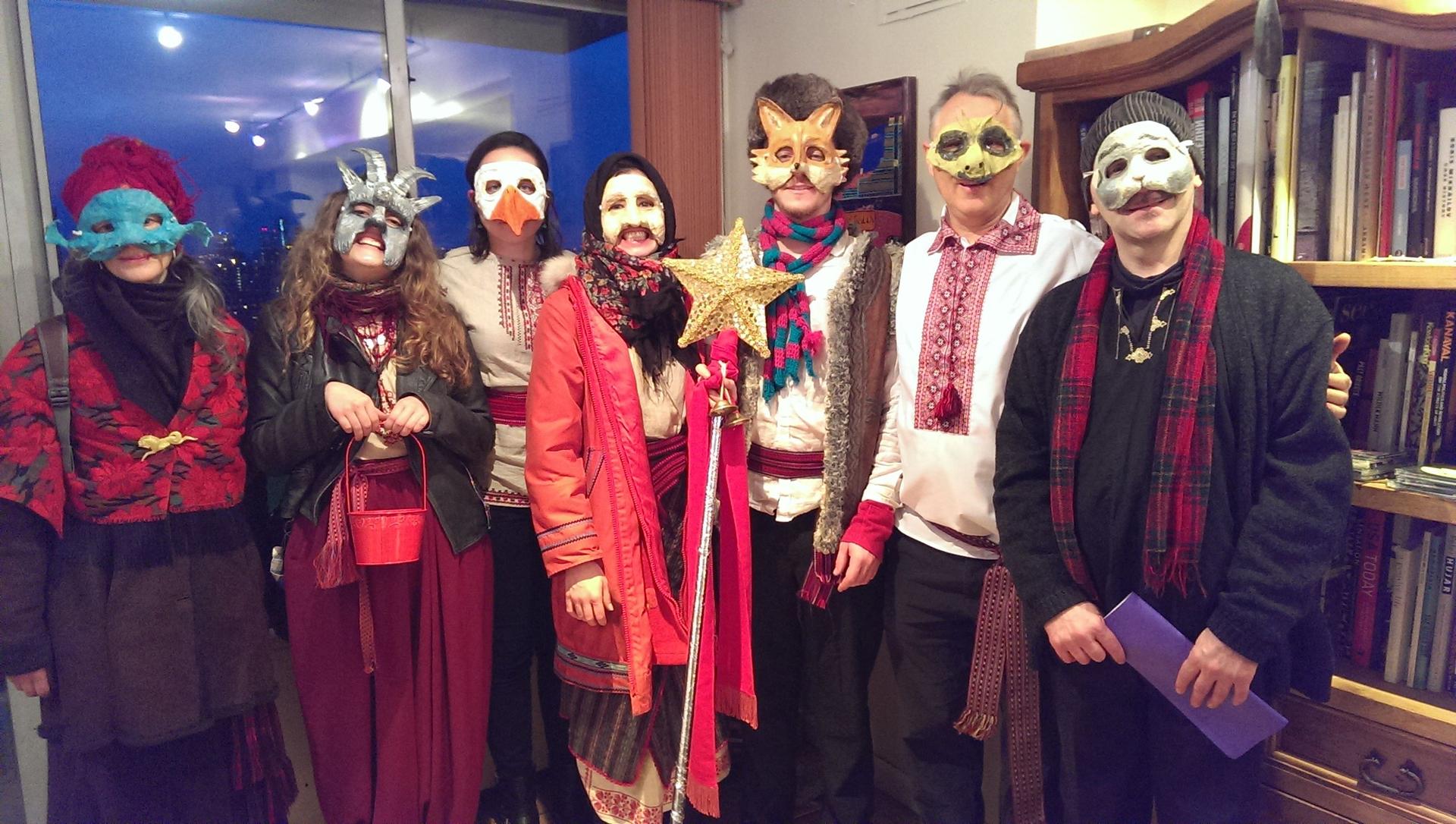Can we choose our ethnic identities based on random obsessions?
Brian Dolphin (in fox mask) and his music group Ukrainian Village Voices went caroling door-to-door to celebrate Koliada, an ancient pagan tradition in Ukraine.
Most Americans come from many other places, but what if your family has been here so long that it feels like you’re from no particular place at all? That can start to feel alienating, especially in a city like New York, where every other person on the sidewalk is speaking a different language.
I met Brian Dolphin for the first time when he arrived in my apartment, wearing a fox mask, and singing ancient Ukrainian songs. This was in January — before Ukraine became a daily fixture on the news.
Brian is the founder and musical director of Ukrainian Village Voices. The group announced they’d be caroling door-to-door to celebrate Koliada, an ancient pagan tradition in Ukraine, so I invited them over.
I was born in Ukraine, but don’t speak any Ukrainian, or own an embroidered blouse — I’d never even heard of this holiday. Brian, on the other hand was born in the US. The irony of all this was not lost on me. Still, I assumed his family connection to Ukraine must be strong. It turns to be more of a “maybe.”
When asked who, exactly, in his family came from Ukraine, Brian replied, “It’s either my great… no it’s my great, great on my father’s side; my father’s father’s father’s father. I think that’s how it works.”
Brian’s story got me thinking about how much the ethnic background we claim — or aspire to claim — has to do with the family members we relate to the most. Or the things we love. Our random obsessions. Brian is a scholar of ethnomusicology. In his case, family lore collided with seeing Slavic folk music performed live for the first time while traveling the world on a Watson fellowship.
“[For] a year I’ve been traveling around the world,” Brian recalled, “studying in India and Norway and Peru and Cameroon and Bali, all these places, and I finally come to a place where, by happenstance, my people from my lineage are there. And that’s when it was like, oh man, these roots. I have these roots too!”
He got so into it, that when he returned, he joined one of New York City’s only Ukrainian choirs: an all women’s choir.*
“I went to the director and said, 'Hey, I’m sorry I’m a guy, but hey, I’m a guy, but I really want to sing this music.' And Nadia Tarnawsky,* she was beautiful enough to be like: We accept everybody that comes and you’re just going to have to sing a little high," he said. "And I was like, all right. I’ll do it.”
Now that takes major cojones.
When the choir disbanded, Brian formed Ukrainian Village Voices and became one of the key organizers on the Ukrainian folk scene. As you might guess, he gets asked a lot about his ties to Ukraine and this mysterious ancestor.
I think we all have mythic kin in our families — the Cherokee great-grandmother, the mysterious bootlegging uncle, sketchy claims to third-tier nobility — but I started wondering how hard it would actually be to hunt down Brian’s Ukrainian roots. My family has its own resident genealogist — great uncle Oleg in St. Petersburg. But Brian didn’t, so I decided I would be his Uncle Oleg.
Since Brian suspected his great-great whatever was Jewish, I started my search at the Center for Jewish History in New York. Despite the name, it turns out you don’t even have to be Jewish to use the center. As Michael Glickman, the center’s chief operating officer, explains, “We’re a public destination so people of really any background can walk in off the street and get the same expertise and the same assistance that a person of Jewish ancestry could.”
OK, but Brian barely has any information about his alleged relative, just a last name and a region of Ukraine: Galicia.
No problem, says Miriam Weiner, senior advisor to the genealogy institute. In little more than an hour, she found some promising leads.
“I found a Jewish name of Dalphin … from this town of Kalimea,” she told me. “I actually found two separate families, one in house 112 and one in house 396.”
Miriam would need to know more in order to prove these were the right Dolphins — Brian’s Dolphins — but she did hand me a folder full of information about his bonafide great-grandfather William. And when I shared this with Brian back at my place, his response was pretty awesome:
“He’d served, he was in World War I. Pshh… look at that. Wow, look, flying school! Cool. Pilot. I’ve always liked planes,” he said.
I like this method of genealogy better: follow your muse backward in time, until you find the ancestor you’re looking for; the one who matches your personality best. The truth is, the Ukrainians who sang the ancient songs that Brian loves to sing wouldn’t even have considered his ancestor one of them, if he was really Jewish.
Me? I’ve been half-Slavic, half-Jewish all my life and I’m ready for something new. My plan: get one of those Internet gene kits and prove I’m actually half-Viking, half-Neanderthal. That’s pretty much how I feel inside.
As for Brian, last time we talked, he was at the Jewish Center, in search of his father’s father’s father’s father.
*Correction: The all-women Ukranian choir was initally described in this story as New York's only Ukranian folk choir. There were other choirs and musical groups at the time. We also mispelled Nadia Tarnawsky's name. We regret the errors.
Our coverage reaches millions each week, but only a small fraction of listeners contribute to sustain our program. We still need 224 more people to donate $100 or $10/monthly to unlock our $67,000 match. Will you help us get there today?
